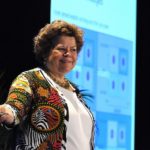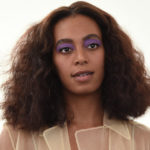Institute of Diversity, Ethics and Peace seeks to create dialogue between Hindus, Muslims, Buddhists, ChristiansBy Faiza Elmasry, VoA News
Minneapolis, MN – October 20, 2006 – Waves of immigration have turned many American cities into global communities, where people of different nationalities and cultural heritages work and live together. At the University of Minnesota, Professor Indira Junghare believes that embracing these cultural and religious differences is essential for local communities to evolve into healthy and thriving societies. To translate her philosophy into action, Professor Junghare has spearheaded efforts to establish a new diversity institute on campus. In her class, Professor Indira Junghare uses every possible image to bring the idea of diversity to her students. “Why do we have so many types of chili peppers? Why do we have so many types of eggplants? What’s the function? What’s the purpose?” she wonders aloud. “Did you see how we’ve constructed, on the basis of similarity, that this is one group and this is another group?” “We are all chili pepper in the end it doesn’t matter what kind,” suggests one of her students. “All these things exist for us to enjoy. The most important thing is that they contribute to the richness of the planet. That’s why they exist,” adds professor Junghare. Junghare believes that in order to create a more peaceful world in the future, young people need to understand diversity and learn about ethics. So, she and a group of her students are working to create a new institute on campus. “Our goal is to establish this Institute of Diversity, Ethics and Peace, then create a dialogue between Hindus, Muslims, Buddhists, Christians,” adding she has always strived “to make students understand the world and become the best human beings.” As a professor, she wants her students to learn more than the material. “They are going to be tomorrow’s leaders and they should have ethical principles.” She says the idea for an institute that offers studies on diversity, ethics and peace grew out of the courses she had been teaching on Asian cultures. “This philosophy is of social concern. It goes one step beyond Buddhism. Its focus is diversity,” she says. “These categories of race don’t work,” she explains, “because even race: Black, white, brown. How many shades of brown can you see? How many shades of white? So, we think that every species, every individual is unique in itself. Because she’s Indian, she must be this; she must be thinking that. No, it’s not like that. There are no two things in this world, no two flowers, even the twins don’t think alike. They have different likings.” In developing her own philosophy, Junghare says she was inspired by ancient philosophers in her native India, who taught that diversity is the very nature of the universe. She says every existence has a purpose and function that contributes to the making of the universe; there is a symbiotic relationship among different forms of existence and all forms should be respected and appreciated. To gain support for the Diversity Institute, its mission and philosophy, Indira Junghare gathered a group of students who have become diversity advocates, including Marina Kalinichev, a culture and Anthropology major. “We’ve written letters to Richard Gere, former Presidents Jimmy Carter and Bill Clinton,” says Marina. “We went to speak with some of our Senators, the people that have more of the authority to make this big leap. We’ve also been going around our campus, within our communities and just talking with different groups and organizations, just to see how they would like to contribute and if they have any ideas we can use to help us along.” Her fellow advocate, Nicole Darcy, studied Chinese at the University of Minnesota in the mid-1980s. She spent the next two decades traveling in China, Tibet, Thailand and India. She worked with the late Mother Teresa and listened to the Dalai Lama’s lectures. She says she has always accepted others who have different backgrounds. “For example, our neighbors adopted a Korean girl that was my age, but none of the children would play with her because she couldn’t speak English,” she says. “I thought they were ridiculous because she had the same toys. When we moved, when I was 5 years old, later that year, to a neighborhood where I had many black friends, many of my white friends would say, ‘Nicole has black friends.’ I’m a singer-songwriter as well. For years, I’ve been singing in Mandarin Chinese and English, in both China and Taiwan, just songs about we live on earth, we come from earth.” Now, Darcy is back at Minnesota to complete her degree Global Studies. When she met Professor Junghare, she immediately signed on as a diversity advocate. She says the institute will be a great addition to the school. “I hope it becomes a department at the University of Minnesota,” says Darcy, who believes that within a year or so, students will at least be able to minor in Diversity, Ethics and Peace. “And maybe one day it will be a major, and the idea will grow to other campuses.” Taking a Diversity, Ethics and Peace course would benefit all students regardless of their major, according to Marina Kalinichev. “I think this goes for any major, for any interest, for people that want to have a job in business, being a doctor, if they want to be a school teacher,” she says. “This is so applicable for any person, whatever they end up doing in their life. It’s not a matter of the job that you do; it’s the way you look at the world and the people around you. The Institute of Diversity, Ethics and Peace will offer students opportunities to work with local communities, agencies and schools, in keeping with Junghare’s holistic approach to studying human cultures and ethical practices. The professor says she hopes these courses will provide students with the values and knowledge to enable them to live and succeed in our inter-connected world. But for now, Indira Junghare and her students are focusing on mobilizing more support to make this academic institution a reality. Elmasry report voiced by R. Sivak — Download (MP3) 1.03MB
This article originally appeared on VoANews.com. |
||
|











